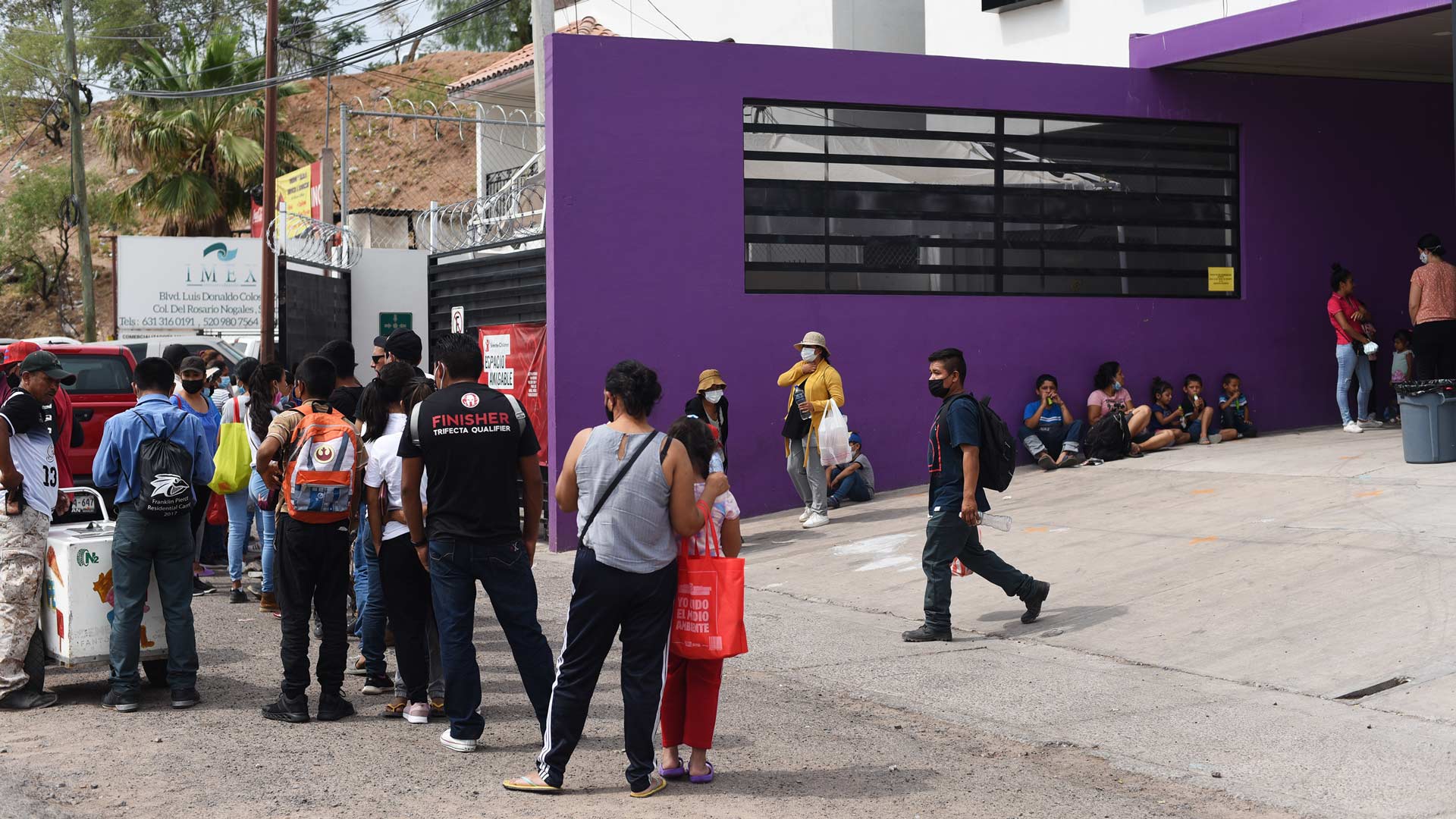 VIEW LARGER Families stand in line to receive food at the Kino Border Initiative in Nogales, Sonora. The shelter receives a few hundred people each morning.
VIEW LARGER Families stand in line to receive food at the Kino Border Initiative in Nogales, Sonora. The shelter receives a few hundred people each morning. Last Spring, Flora, who asked we just use her first name, obtained an appointment for lawful admission into the U.S. through the CBP One app, after trying every day for 8 months.
“I'm here to give my daughters a better life because I am a single mother,” Flora said, speaking in Spanish. “I have suffered a lot with their father. I am very grateful to God because He knows everything I have been through.”
Flora fled her abusive partner in her home state, Chiapas — in southern Mexico. She came to the Centro de Esperanza migrant shelter in Sonoyta, with her two daughters — ages 4 and 5 — hoping to enter the U.S.. She says she’s grateful to God for getting an appointment through the app.
In the later half of the Biden administration, some migrant shelters at the U.S.-Mexico border have become temporary homes for people trying to get an appointment through CBP One for admission into the U.S. Ending that option could potentially leave thousands in limbo at the border.
Currently more than 150 people, many of them children, make a temporary home at the small Sonoran shelter just across the international border from Lukeville, Arizona. And they’ve been waking up every morning opening the app with the hope of getting an appointment.
Aaron Flores, a manager at the shelter, says the app helped slow down unauthorized border crossings at the southern border, which decreased by more than 80% in the last year.
“And if he closes the app, he's going to have a huge problem in his hands, because there's going to be a bunch of people trying to go across the fence,” Flores says. “If you ask me, and I don't want to be disrespectful to the president of your country, but that's pretty dumb.”
Ariel Ruiz Soto, with the Migration Policy Institute, said these Biden-era programs were intended to create order at the border and provide more lawful pathways into the United States.
“It was meant to try to reduce the sort of chaos that was happening at the border at that time,” Ruiz Soto says.
Ruiz Soto says CBP One was perhaps the most important of these programs, despite its numerous setbacks. Last month the number of people coming into the country through legal pathways such as CBP One finally surpassed the number of people coming in unauthorized.
People who made it through an initial screening, which included criminal background checks, were given up to two years parole into the United States.
“That makes a world of difference for migrants,” Ruiz Soto says. “It gives people access to work more quickly. It gives them access to be able to receive other sorts of benefits, but it also allows them to have an easier process of integration once they get to the United States communities they're going to.”
During that time they could apply for asylum or try to adjust their migration status.
“CPB One has really reshaped how migrants arrive and where they arrive at the US Mexico border,” he says. “There will be, and this is likely going to continue, many stakeholders, politicians and others, who will think that the authority of parole is being abused or was abused by the Biden administration. But at least at the local level for migrants, CBP One has been a game changer.”
Ruiz Soto says without it migrants, wait longer in difficult conditions and often undergo a dangerous and costly journey to come to the United States unauthorized.
Last spring, Flora waited at the border for 8 months with her two young daughters because she felt she had no other choice.
"I am afraid,” Flora said. “I have that fear. I always thought that way because he used to tell me that wherever I am, he would find me. He said he would take my life along with my two daughters. But I always prayed to God. And here I am, still standing."
Flora went to go live with her mom, who was already in Jackson, Mississippi. She’s working and her daughters are in school.

By submitting your comments, you hereby give AZPM the right to post your comments and potentially use them in any other form of media operated by this institution.